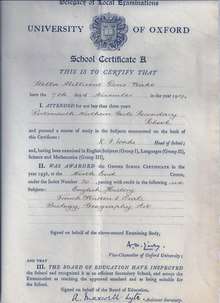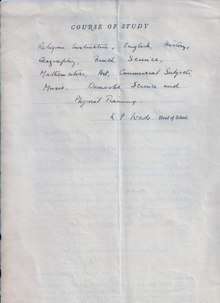School Certificate (United Kingdom)
The United Kingdom School Certificate was an educational attainment standard qualification, established in 1918 by the Secondary Schools Examinations Council (SSEC).

The School Certificate Examination was usually taken at age 16. Performance in each subject was graded as: Fail, Pass, Credit or Distinction. Students had to gain six passes including English and mathematics to obtain a certificate. To obtain a "matriculation exemption" one had to obtain at least a Credit in five subjects including English, mathematics, science and a language. Those who failed could retake the examination. Some students who passed then stayed on at school to take the Higher School Certificate at age 18.

The School Certificate was abolished after the GCE O-Level was introduced in 1951.[1] The School Certificate also existed in a number of Commonwealth countries such as Australia and Singapore at various times.
See also
- School Certificate (Australia)[2]
- School Certificate (New Zealand)
- School Certificate (Mauritius)
- School Certificate - Other variants: Zambia,[3] Nigeria[4]
- Higher School Certificate (United Kingdom)
- GCE Ordinary Level (International) (O-Level)
- Certificate of Secondary Education (CSE)
- General Certificate of Secondary Education (GCSE), which replaced the O-Levels and CSE
- International General Certificate of Secondary Education (IGCSE), which is offered with or instead of O-Levels internationally
- General Certificate of Education (GCE), which comprises O-Levels and A-levels
References
- School Certificate at History Learning Site. Retrieved 6 September 2012
- http://www.smh.com.au/national/education/coalition-to-abolish-year-10-certificate-20110803-1ibos.html
- http://www.postzambia.com/news.php?id=5916
- http://www.ngrguardiannews.com/2015/02/going-to-secondary-school-without-sitting-for-examination-is-enough-to-contest-election/